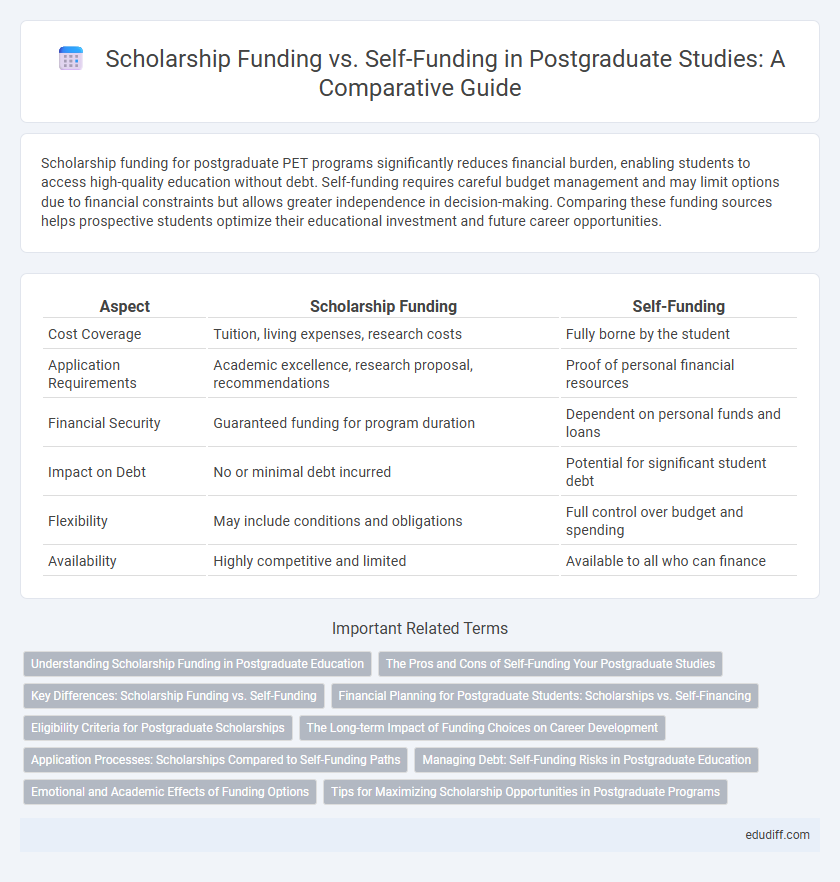Scholarship funding for postgraduate PET programs significantly reduces financial burden, enabling students to access high-quality education without debt. Self-funding requires careful budget management and may limit options due to financial constraints but allows greater independence in decision-making. Comparing these funding sources helps prospective students optimize their educational investment and future career opportunities.
Table of Comparison
| Aspect | Scholarship Funding | Self-Funding |
|---|---|---|
| Cost Coverage | Tuition, living expenses, research costs | Fully borne by the student |
| Application Requirements | Academic excellence, research proposal, recommendations | Proof of personal financial resources |
| Financial Security | Guaranteed funding for program duration | Dependent on personal funds and loans |
| Impact on Debt | No or minimal debt incurred | Potential for significant student debt |
| Flexibility | May include conditions and obligations | Full control over budget and spending |
| Availability | Highly competitive and limited | Available to all who can finance |
Understanding Scholarship Funding in Postgraduate Education
Scholarship funding in postgraduate education provides financial support based on academic merit, research potential, or specific criteria set by institutions or external organizations, reducing the financial burden for students. These scholarships often cover tuition fees, living expenses, or research costs, enabling recipients to focus on their studies without financial distractions. Understanding the eligibility requirements, application processes, and benefits of various scholarship programs is crucial for maximizing funding opportunities in postgraduate studies.
The Pros and Cons of Self-Funding Your Postgraduate Studies
Self-funding postgraduate studies offers flexibility in choosing programs and managing time without reliance on external approval, but it often entails significant financial burden and stress due to high tuition fees and living expenses. Self-funded students may face limited access to university resources and networking opportunities typically available to scholarship recipients. Balancing part-time work with academic commitments can impact study quality and prolong degree completion time.
Key Differences: Scholarship Funding vs. Self-Funding
Scholarship funding for postgraduate studies provides financial support based on academic merit or specific criteria, reducing the financial burden and often including tuition fees and living expenses. Self-funding requires students to cover their own educational costs, offering greater control over their program but increasing financial responsibility and potential debt. Understanding the key differences helps students make informed decisions regarding affordability, eligibility, and long-term financial impact.
Financial Planning for Postgraduate Students: Scholarships vs. Self-Financing
Effective financial planning for postgraduate students involves weighing scholarship opportunities against self-funding options. Scholarships can significantly reduce overall education costs by covering tuition fees and living expenses, often requiring competitive academic performance or research proposals. Self-financing demands careful budgeting and may include personal savings, loans, or part-time work, which can increase financial pressure but offer greater autonomy in educational choices.
Eligibility Criteria for Postgraduate Scholarships
Postgraduate scholarships typically require applicants to demonstrate academic excellence, relevant research experience, and sometimes financial need or community involvement. Eligibility criteria often include having a first-class degree or equivalent, meeting specific course or research area requirements, and fulfilling residency or nationality conditions. Self-funding students bypass these requirements but face the challenge of covering tuition and living expenses without external financial support.
The Long-term Impact of Funding Choices on Career Development
Scholarship funding significantly enhances career development by reducing financial stress, allowing postgraduate students to focus on research excellence and networking opportunities that lead to advanced job prospects. Self-funding often necessitates balancing work and study, which can limit the time available for skill-building and professional growth, potentially delaying career advancement. Long-term, scholarship recipients tend to access higher-level positions and greater academic recognition, while self-funded graduates may face slower progression due to initial economic constraints.
Application Processes: Scholarships Compared to Self-Funding Paths
Scholarship funding for postgraduate studies typically requires a formal application process involving academic transcripts, letters of recommendation, and often a personal statement or research proposal, with deadlines set well in advance. Self-funding paths bypass competitive selection criteria but demand proof of financial capability, such as bank statements or loan approvals, during university enrollment. Understanding the distinct documentation and timing requirements for scholarships versus self-funding ensures a smoother postgraduate admission experience.
Managing Debt: Self-Funding Risks in Postgraduate Education
Self-funding postgraduate education often leads to substantial debt accumulation due to high tuition fees and living expenses. Managing this debt requires careful budgeting and long-term financial planning to avoid burdening future income with loans. Scholarship funding reduces financial strain by covering significant costs, minimizing the risk of debt and enabling focused academic progress.
Emotional and Academic Effects of Funding Options
Scholarship funding for postgraduate studies significantly reduces financial stress, enhancing emotional well-being and allowing students to focus more effectively on academic performance. Self-funding often increases pressure and anxiety due to financial burdens, which can detract from study time and academic concentration. Research indicates that students with scholarship support demonstrate higher motivation, improved grades, and greater engagement in their academic communities compared to self-funded peers.
Tips for Maximizing Scholarship Opportunities in Postgraduate Programs
Maximizing scholarship opportunities in postgraduate programs requires thorough research of university-specific and external funding sources, including government grants, private foundations, and international organizations. Tailoring application materials to highlight academic achievements, research potential, and leadership qualities significantly improves the chances of securing awards. Early application submission and networking with faculty members and scholarship committees also enhance access to exclusive funding options.
Scholarship Funding vs Self-funding Infographic

 edudiff.com
edudiff.com